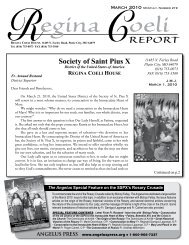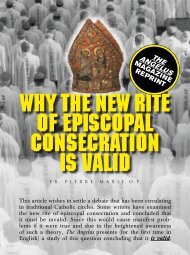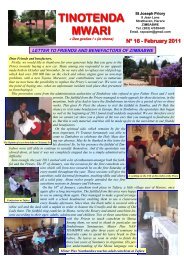Is Feeneyism Catholic? - Society of St. Pius X
Is Feeneyism Catholic? - Society of St. Pius X
Is Feeneyism Catholic? - Society of St. Pius X
Create successful ePaper yourself
Turn your PDF publications into a flip-book with our unique Google optimized e-Paper software.
70 IS F EENEYISM C ATHOLIC?<br />
Summa such a delight. As we have seen above, 99 <strong>St</strong>. Thomas mentions<br />
baptism <strong>of</strong> desire in other places <strong>of</strong> his works, but it is <strong>of</strong><br />
course impossible to give every quote!<br />
One word to help the reader who is not acquainted with the<br />
theology <strong>of</strong> the sacraments. <strong>St</strong>. Thomas distinguishes three elements<br />
in each sacrament: 1) sacramentum tantum–the exterior<br />
sign (e.g., water in baptism); 2) sacramentum et res–a “sign and reality,”<br />
(e.g., the character <strong>of</strong> baptism) an intermediary element,<br />
signified and effected by the exterior sign, but itself further signifying<br />
and causing the ultimate reality, grace; 3) res tantum–the reality<br />
itself, i.e., the ultimate reality signified in the sacrament, that<br />
is the sacramental grace, i.e., sanctifying grace with a special fruitfulness<br />
to further actual graces to practice the virtues proper to<br />
each sacrament (graces to live as a child <strong>of</strong> God, as a soldier <strong>of</strong><br />
Christ, as a priest <strong>of</strong> Christ, as a good Christian spouse, etc.). Baptism<br />
<strong>of</strong> blood and baptism <strong>of</strong> desire are called “baptism” because<br />
they produce the reality itself <strong>of</strong> the sacrament <strong>of</strong> baptism, i.e.,<br />
they wash sin and give sanctifying grace, the life <strong>of</strong> the soul, the<br />
new birth.<br />
Whether three kinds <strong>of</strong> baptism are fittingly described,<br />
that is, baptism <strong>of</strong> water, <strong>of</strong> blood, and <strong>of</strong> the Spirit?<br />
(Summa Theologica, III, Q.66, A.11.)<br />
Obj. 1: It seems that the three kinds <strong>of</strong> Baptism are not fittingly<br />
described as Baptism <strong>of</strong> Water, <strong>of</strong> Blood, and <strong>of</strong> the Spirit,<br />
i.e., <strong>of</strong> the Holy Ghost. Because the Apostle says (Eph. 4:5):<br />
“One Faith, one Baptism.” Now there is but one Faith. Therefore<br />
there should not be three Baptisms.<br />
Obj. 2: Further, Baptism is a sacrament, as we have made<br />
clear above (Q.65, A.1). Now none but Baptism <strong>of</strong> Water is a<br />
sacrament. Therefore we should not reckon two other Baptisms.<br />
Obj. 3: Further, Damascene (De Fide Orth., iv) distinguishes<br />
several other kinds <strong>of</strong> Baptism. Therefore we should admit more<br />
than three Baptisms.<br />
On the contrary, on Heb. 6:2, “Of the doctrine <strong>of</strong> Baptisms,”<br />
the gloss says: “He uses the plural, because there is Baptism<br />
<strong>of</strong> Water, <strong>of</strong> Repentance, and <strong>of</strong> Blood.”<br />
99 ST, III, Q.68, A.3, see p.47; ST, Q.73, A.3, see p.38.











